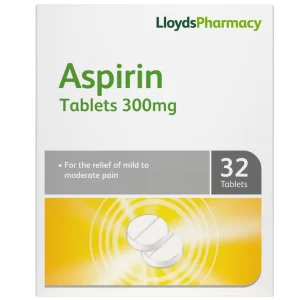Aspirin for
Central Chest Pain

First aiders and medication
First aiders are permitted to give aspirin – actually it’s the only medication that they are able to administer in first aid. So, what’s it for, when should we give it, and what should we check first?
Central chest pain.
If someone is complaining of central chest pain, which is not caused by a recent accident or trauma to the chest, it could be caused by heart problems. The heart is a muscle, and needs a blood supply to deliver oxygen to the tissue. If the main artery to the heart becomes blocked, or restricted, blood can’t oxygenate the muscles. This causes pain as the tissue beyond the blockage dies, and, if the muscle can’t work, the heart will eventually stop beating. The blockage and resulting muscle pain is called a heart attack, and when the heart stops, that’s called a cardiac arrest.
So what does aspirin do?
Aspirin makes the blood glide better, it makes it less sticky. If the casualty takes aspirin, the blood can slip past the blockage more easily, and the blockage (if it’s caused by a clot) may become less sticky too. This means that blood can continue to get to the heart muscle.
So when should a first aider give aspirin?
If the casualty is complaining of central chest pain, dial 999, and then you can give 300mg of aspirin straight away. The should chew it, not dissolve it in water, as it works much faster. However, you need to check a few things first.
Is Aspirin safe for everyone?
No, aspirin should never be given to children under 16. If they are complaining of central chest pain, call 999 and get help immediately.
If the casualty is over 16, you should ask them 2 questions first. ‘Are you already on blood thinners?’ If they are, do not give aspirin, but inform the call handler that they take medication daily. You should also ask, ‘are you allergic to aspirin?’ If the casualty is allergic, it can cause anaphylaxis, a life threatening allergic reaction. If they answer yes to either question, do not give them aspirin, but ask them to sit in a comfortable position, and try to keep them calm.
Should we keep the aspirin in the first aid box?
No, medication shouldn’t be kept in the first aid box, as the kit should be accessible for anyone to use, and giving out aspirin should only be done by a competent first aider. It should be kept out of reach of children, but close at hand in case it’s needed in an emergency. In a school or nursery setting, it should be kept in a high cupboard in a kitchen or office where the children are not allowed without supervision.
What should we do whilst we wait for the ambulance?
Whilst you wait for the ambulance, keep the casualty comfortable, and calm. You can gather information by following ‘SAMPLE’:
Signs and symptoms: note down what they are feeling and what they appear like (skin colour, sweaty, breathing etc)
Allergies: any allergies to food, medication? Do they have an auto injector?
Medication: are they on any medication? What is it? Where is it?
Previous medical history: anything like this happened before? Any other medical conditions?
Last meal: what did they last eat or drink, and when?
Events: what events led up to this? Were they doing exercise, stressed, panicked or have they been feeling unwell for a few hours?
Be prepared to start CPR if the casualty collapses and stops breathing, and if that happens, dial 999 and inform them that the casualty is now in cardiac arrest.
All this, and more besides is covered on our FAW course.


